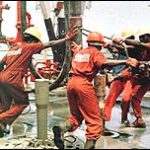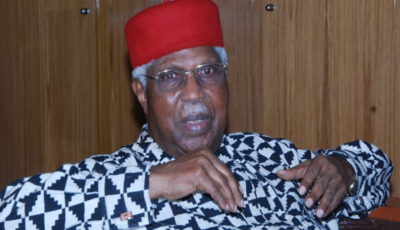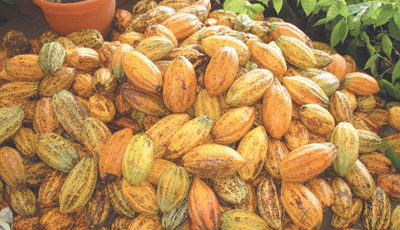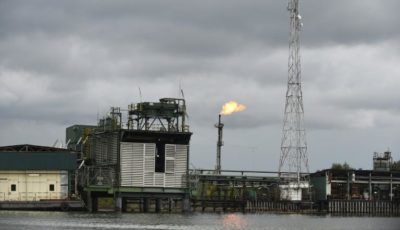PETROLEUM POLITICS OF DO OR AFFAIRS: ECOLOGICAL WAR IN AKABUKA COMMUNITY
Nwokezi John Ikoro, November 10, 2010 at 6:16 am

In 2005 100 soldiers were deployed in Akabuka community following sustained protest by the community over certain grievances with Total E & P Nigeria Limited (TEPNG) when it was Elf Petroleum Nigeria Limited. Akabuka with more that 14 oil wells reacted swiftly by chasing away the oil workers and expressed fears that if the company continued to drill oil and gas from its wells through a facility located outside the community, it would lose its host community rights in OML 58 over allegations of continued practice of directional drilling by the company against an earlier agreement. Directional drilling enables the drilling of oil and gas from different locations within an area, without any activity being carried out in the community where oil is located.
In November 10, 2010 another related current violence clashed with Nigerian soldiers in Akabuka community, left 2 persons dead with burnt chases of 16 operations vehicles. The daily (SUN) Newspaper reported that at least two persons were confirmed dead and 50 others wounded on Tuesday, November 10, 2010 in a clash between youths and soldiers in Akabuka Community in Egi Clan of Rivers State. About 16 Hilux vans and some pipeline-laying equipment that belong to Siapem Contracting Nigeria Limited, an oil servicing company was burnt.
The report also stated that the protesting youths of the Akabuka community snatched a soldier’s gun which was later recovered. This was the climax of the crisis that started when some members of the Egi Oil and Gas Producing Families in the area embarked on a peaceful protest of an alleged non-implementation of a Memorandum of Understanding (MoU) by Total Oil Company. Some youths in Akabuka, who had been grumbling over alleged failure of Saipem, a part of consortium firm to Total, to employ them, were said to have joined the protest and vandalized vehicles and equipment belonging to the company.
One of the youths, the second son of “Theo and Ejeche’ of Akabuka community is widely believed to be innocent died after receiving heavy gun fire from the soldiers with about 50 others seriously wounded during the protest. The death of one of the youths angered his colleagues who were further infuriated to accost the security men stationed within the company premises and snatched the gun of one of the soldiers.
Consequently, the soldiers pursued the youths into the Akabuka community and eventually recovered the gun, during which one of them was seriously wounded and later died. Sources stated that three days earlier, employees of another company in the area, Ponticeli Nigeria Limited, had protested the death of one of their colleagues who was asthmatic. The grouse of the workers was that the company’s ambulance was not readily available to take the deceased to the hospital when he slumped. This raised fears and concern bothering on international and domestic human rights and lack of respect for dignity human persons and labour.
These reactions are unconnected to landlords in the area position to stage showdown’ with Total E & P Nigeria Limited over the oil company’s failure to pay them compensation for oil and gas pipelines that run through some of the communities in Egi land. This implies that increasing capital-intensive exploration and production of oil and natural gas by the operators of industrial economic development projects in Egi Clan of Rivers State is contributing significantly to more and more environmental degradation on indigenous people’s customary lands.
Local families and communities comprising customary land title holders, who have granted lands for industrial developments, are not given priority attention with sustainable development and corporate interests. Organized town crying should be one the series of dialogic communication and the peaceful means of promoting individual, families, communities and corporate social responsibilities and resolution of grievous and controversial environmental sustainability issues.
For example, Umu-Oka families, Oka Community People of Akabuka Town in Rivers State, are one of such local families and community among the oldest in Oil Mining Lease no 58 in Egi Clan made a deep ecology argument in May 8, 2007 accusing Total of imposing the surveyors, land valuers and Environmental/Social Impact Assessment E/SIA, assessors (contractors) on Umu-Oka Families, Oka Community People of Akabuka Town. This deep ecological case report illustrates the experiences of Umu-Oka Families, Oka Community People of Akabuka Town in Rivers State with the co-existence of ancient and modern industrial economic development projects as a legitimate social and economic business union.
These led to feelings of unpleasant violation and abuse of economic, social, cultural, and environmental human rights to sustainable development equity. Based on eyewitness accounts, the surveyors, land valuers and E/SIA assessors (contractors) committed unpardonable/unprofessional procedural land ethics errors and deep ecological economic flaws that enable Total representatives to permutate and misrepresent facts and figures that corrupted the E/SIA Reports of the OML 58 Upgrade Projects, mass land acquisition assessments processes.
The surveyors, land valuers and E/SIA assessors (contractors) are strongly held liable, responsible and accountable for trickery, deceptions, trespass and misappropriation of Umu-Oka Families, Oka Community People of Akabuka Town sacred Ezi-Zokah farmlands without customary permission. According to the eyewitness illustrator, Umu Oka Families, Oka Community People of Akabuka Town did not participate in real time baseline study before the OML 58 Upgrade projects.
Local participation in a project baseline study is a traditional methodology used to conduct baseline study, prelude to Environmental/Social Impact Assessment E/SIA. Umu Oka Families, Oka Community People of Akabuka Town as human group – genus homo of the natural social and cultural organization in Egi Clan, Niger Delta Bioregionalism and Nigerian supra society as a whole are natural possessors of economic use of land, in the traditional institutional rules of the [hereditary rights of Egi Ogba customary Laws]. That benefits “common hold” of propertied groups in Nigerian constitutional determination, under the custody of the Governor of the Rivers State, the eyewitness illustrator argued.
The eyewitness illustrator argued that there was no baseline study that would have enabled the understanding of the past human groups capacity development of the – genus homo, and current niche of human beings in Umu Oka Families, Oka Community People of Akabuka Town deep ecological economics use of the scared farmlands and wetlands swamps fish pond bank seasonal waters in the proximity of the OML 58 Operational Facilities Upgrade Projects phase one and the biophysical environmental and socio-psychological conditions in the deep ecological custom concerns and interests of Umu Oka Families, Oka Community People.
The baseline study that would have reflected bioregional development and other traditional, social and cultural experiences such as local (indigenous) families’ receptivity and patterns of land resources use, now affecting the OML 58 Facilities Upgrade Projects Policy Decisions, were not identified and considered because, there was no baseline study before the E/SIA Report of 2005, 2006 and 2007 respectively.
These doses not conform to the principles of universality of human rights to sustainable development equity. Practically, the real grievous issues in controversy in this matter has indigenous cultural and ideological elements that will continue to generate unresolved argumentations relevant or irrelevant contestations, in the context of deep and social ecological economic needs of the present generation without compromising the ability of the future generations to meet their own needs. Since this matter is now settled amicably out of court, Umu-Oka Families, Oka Community People of Akabuka Town opted to questioning the economic and political policy in public which necessitated the massive appropriation of it’s land without customary permission as required in deep ecology spiritual movement – every life form on Earth have an intrinsic value.
Intrinsic value is the ultimate premises for local participation in sustainable economic development projects that affects the only indigenous means of subsistence through baseline study, grounded in traditional method of institutional rules and regulations. The Traditional method is a mandatory procedural meeting with families and communities leaders to obtain their customary permission and traditional agreement for corporation. To publicize the meetings through word of mouth – buzz, town crying, collect and disseminate scientific/empirical information in families and communities levels, via audio/visual aids with drawing and graphic models.
Under these methodological procedures, Umu-Oka Families, Oka Community people of Akabuka Town revered farmlands located in the proximity of the industrial economic development projects zone in OML 58 Upgrade Projects phase one should have been identified properly and considered as one of the potential or heavily affected non-humanized sacred, protected and conserved wetland fish pond seasonal bank waters swamps in a deltaic rain forest. Umu-Oka Family, Oka Community People of Akabuka Town unusual concerns, needs and baseline conditions interests were not formally collected from the traditional economic land users and Traditional Environmental Knowledge (TEK) Experts or custodians.
Therefore, the 2005, 2006, and 2007 E/SIA Reports preceded the compulsory baseline study that would have ensured strategic local participation in the policy decision that now affects Umu-Oka Families, Oka Community Peoples of Akabuka Town was not carried out. This is an unpardonable anomaly in the professional practice of Environmental Impact Statement for Sustainable Development in the context of Nigeria. Environmental and Industrial Development Projects Communications Management expertise is highly needed to correct this anomaly in Zones of the Egi Clan Communities and beyond.
A baseline study in the context of environmental communication for sustainable development, is an ethnographic interpretation presentation (Case Report or Field Study) that focuses on the description of the human groups – genus homo and the current niche of human coexistence of the individual, family, community and society experiences, rooted in the specific social, cultural and environmental conditions of the geographical area, with a mandatory plan that would legitimately mitigate the anticipated positive and negative impacts of the projects.
The Federal Environmental Protection Agency FEPA, in Nigeria prescribes a mandatory baseline study for category one (I) industrial development projects such as oil and gas mining campaigns, oil and gas fields development, overland leaner pipelines construction, construction of oil and gas separation, processing, handling and storage facilities, construction of combined cycle power station, etc (FEPA , 1995. Pp. 8-11). In the construction of the industrial economic development projects operators of OML 58 Upgrade Projects phase one, there was no baseline study and so Umu-Oka Families, Oka Community Farmland and Farmers as one of the major geographical areas with a special indigenous families and community populations characteristics were not identified and considered for high risk in there social and deep ecological economics sustainability management and standard relationships with the ecospheres or biophysical environment of the projects, historical backgrounds, political community philosophy and social resources, culture, attitudes and socio-psychological conditions.
The appropriation of more than 18 hectares of land from Umu-Oka Families, Oka Community People of Akabuka Town is a breach of human, economic, political, social, civil, political and cultural fundamental rights to sustainable development equity and dignity of agricultural labour. This translates to stimulated environmental, social and cultural degradations, i.e. no baseline study that would have made plans to reduce poverty and the material improvement of the Well-Being of Umu Oka Families, Oka Community People of Akabuka Town peculiar environmental sustainability needs with their counterparts in Umu-Aye and Umu-Ikoro families. No baseline study was conducted before the 2005, 2006 and 2007 IPP, OUR and Upgrade Projects Environmental/Social Impact Assessment, E/SIA Reports.
This is unprofessional, local and global unethical practice. For example, according to the (World Bank , 1996a in Nwafor, 2006. p.476), “a project and its environment form a dynamic system with interacting components. Often, there are feedback loops through which the sequences of environmental changes caused by a project can ultimately affect it”. Therefore some key socio-cultural environmentalism and traditional practices, such as some of the necessary customary protocols were neglected before the appropriation and acquisition of the more than 18 hectares of land and the corridor pipeline from Umu Oka Families, Oka Community People of Akabuka Town. This is a violation and abuse of Umu-Oka Families, Oka Community People of Akabuka Town Customary Right of Occupancy, though extinguished into the prerogative power of the Governor of the Rivers State, is a matter of constitutional determination.
Some part of the acquired land area is Umu Oka Families, Oka Community People of Akabuka Town non-humanized part of the native ancestral common forest and wetland fish ponds bank swamps, maintained in accordance with the Sacred Supreme Deities. Umu Oka Families, Oka Community People of Akabuka Town perception and belief about their land is rooted in the intricate system of the indigenous Agrarian society culture of subsistence survival, cropping, fishing, and hunting philosophy, including economic sources of non-formal income generation.
As a result the first and second elders who would have performed the rites died within the period of the land appropriation, acquisition and assessment processes. Now it appears certainly that the Sacred Supreme Deities are really very angry and Umu Oka Families, Oka Community People of Akabuka Town shall eventually reverse the anger or premonition of the Supreme Sacred Deities through astrological pendulum – movement of (Agbra Ali – god and goddess of their ancestral land) to snuff life out of the perpetrators of sociological and ecological economic fraud stars who deceived Umu-Oka Families, Oka Community People of Akabuka Town to acquire the more than 18 hectares of land, including the corridor pipelines land.
The final appraisal meeting that was aimed at ascertaining the points of special internal benefits agreement agreed at the meeting of February 1, 2007 in Elder E. N. Ikoro, JP house at Akabuka, did not take place between the industrial economic development projects operators representatives and Umu Oka Families, Oka Community People of Akabuka Town representatives. The industrial economic development projects operators surveyors, land valuers and E/SIA assessors (contractors) committed induce technical errors in the mapping of the acquired area of land during the surveying and assessment processes. The surveyors, land valuers and E/SIA assessors (contractors) were imposed on Umu Oka Families, Oka Community People of Akabuka Town. Total representatives strongly (convinced) Umu-Oka Families, Oka Community People of Akabuka Town: elders, chief, women, youths, widows and widowers to believe, that Total will enter into special beneficial agreement with the heavily affected Families in general, but Umu Oka Families, Oka Community People of Akabuka Town rejected it and maintained to have a personalized agreement with Total. It is the need to have the particularized agreement that, Umu-Oka Families, Oka Community People of Akabuka Town donated the highest land for the OML 58 Operational Facilities Upgrade Projects phase one in ‘Part A’.
By implication, for environmental social justice, Umu-Oka Families, Oka Community People of Akabuka Town claims that the surveyors; land valuers and E/SIA assessors (contractors) breached their human, economic, political, civil, social and cultural fundamental rights to sustainable development equity and disrespected the conservation of their Sacred Farmland. Therefore, the surveyors, land valuers and E/SIA assessors (contractors) are heavily liable to the depletion, destruction, desecration, abuse and violation of the cultural, social, economic capitals, environmental and natural resources by the appropriation and acquisition of the more than 18 hectares of land from Umu-Oka Families, Oka Community People of Akabuka Town with trickery and deceptions.
The appropriation and acquisition was characterized by trickery, deceptions and abuse of indigenous hereditary and customary intrinsic values of the non-humanized economic use of land rights, for natural sustainable livelihoods and inter/intra generational sustainable development equity. Settlement of the real grievous issues in controversy out of court was necessitates to sustain the historical granting of land, a vital factor of business production relationship existing between the Umu-Oka Families, Oka Community People of Akabuka Town and Total.
The appropriation and acquisition of the more than 18 hectares of land was done without customary appeasing of the Ancestral Supreme Deities of the Umu-Oka Families, Oka Community People of Akabuka Town. The surveyors, land valuers and E/SIA assessors (contractors) did not obtain formal traditional permission before entering into the Umu-Oka Families, Oka Community People of Akabuka Town revered forest and wetland seasonal swamps fish ponds. The surveyors, land valuers land E/SIA assessors contractors were imposed on Umu-Oka Families, Oka Community People of Akabuka Town by the industrial economic development projects operators. This Implies violation and abuse of first, second, and third generation fundamental human rights to sustainable developments equity and disrespect for dignity of labour and human persons.
There are ethical flaws in the presentation of figures committed by the surveyors and the land valuers that enable Total representatives to mismanage the funds meant for the E/SIA into the appropriation, acquisition and assessment processes at the fatal deprivation and impoverishment of Umu-Oka Families, Oka Community People of Akabuka Town. Total is yet to cede at least one direct employment of a member of Umu-Oka Families, Oka Community of Akabuka Town who is qualified as part of the benefits derived from the granting of the more than 18 hectares of land for the OML 58 Upgrade Projects, since 2007 till now.
The land surveyors, valuers and E/SIA assessors (contractors) made some procedural errors in the collection and dissemination of information on the more than 18 hectares of land acquired, by ignoring the protectorate survey plane of the Ezi-Zokah Farmland, at the detriment of Umu-Oka Families, Oka Community People of Akabuka Town. On these grievous and controversial issues, Umu-Oka Families, Oka Community People holds or bears unending latent and pent-up anger and grudges against Total for defilements sorrows of losing their native lands to foreigners or outsiders, aided by their own brothers. There is no violence on earth greater than the removal of an indigenous population from its native land and preventing them from depending on their abundant natural and environmental resources for economic, social, cultural and subsistence is a cultural violence.
Therefore an extra-ordinary ecological fund agreement for projects site-specific community relationships between Total and Umu Oka Families, Oka Community People of Akabuka would timely improved the nature of the business-community relations for the OML 58 Upgrade Projects phase one, host environments sustainability components. There must be a means to reduce the physical, biological, physiological, cultural, social, environmental and economic disorganization of Umu-Oka Families, Oka Community People of Akabuka Town way of subsistence living in their natural social and cultural system of traditional Agrarian and republican life style.
The conversions of customary lands into Oil Mining Lease Concessionary No 58, Upgrade project by the Federal Government of Nigeria direct policy results in the loss of Umu-Oka Families, Oka Community People of Akabuka Town Ezi-Zokah Farm – Bush, Forest and Agbo-Uburu Fish Ponds, Fallow Bank Swamps. This non-humanized Farmland is a scared domain of various ancestral divinities rooted in the conscience of the present and past progenies of Umu-Oka Families, Oka Community People of Akabuka Town.
Although, it is a constitutional determination, people do not actually own legal right to land extinguished by the executive power of the Governor of the Rivers State. However, Umu-Oka Families, Oka Community People of Akabuka Town have maintained common hold land title ownership and legal rights to customary land that other people and institutions have a duty to respect, as a traditional conservation and protection of natural and environmental resources from time immemorial or centuries.
The ecological destruction now going on in Egi Clan, especially in some Etiti and Umu-Obor Zones: Ogbogu, Akabuka, Obite, and Obagi will not be cured by technological waste management. Therefore, the current arrogant health, safety and environmental notions of the polluter and destroyer must be resisted with reconciliatory negotiation and settlement communications. The resistance must begin with environmental sustainability issue which states that no human being have right to reduce the intrinsic values of the richness and diversity of life forms on earth except to satisfy vital needs. Therefore all social and environmental economic communication most be reformed to re-enforced land ethics and deep ecological economic management ideals.
There is no violence on earth greater than the loss of ones native lands and to move an indigenous population from its cultural land is a deep ecological economic violence it self. The appropriation of lands from Umu-Oka Families, Oka Community People of Akabuka Town for industrial economic development is an open wound on the universal maximization of self-realization for the affected Umu-Oka Families, Oka Community People of Akabuka Town that will be difficult to heal from the present generation to other generations.
Nwokezi John Ikoro November 10, 2010 at 6:20 am
Nwokezi J. Ikoro B.Sc. Mass Comm., RSUST, PHC. FFIF, MA, OU. Athens, USA. Communication and Development Specialist.






